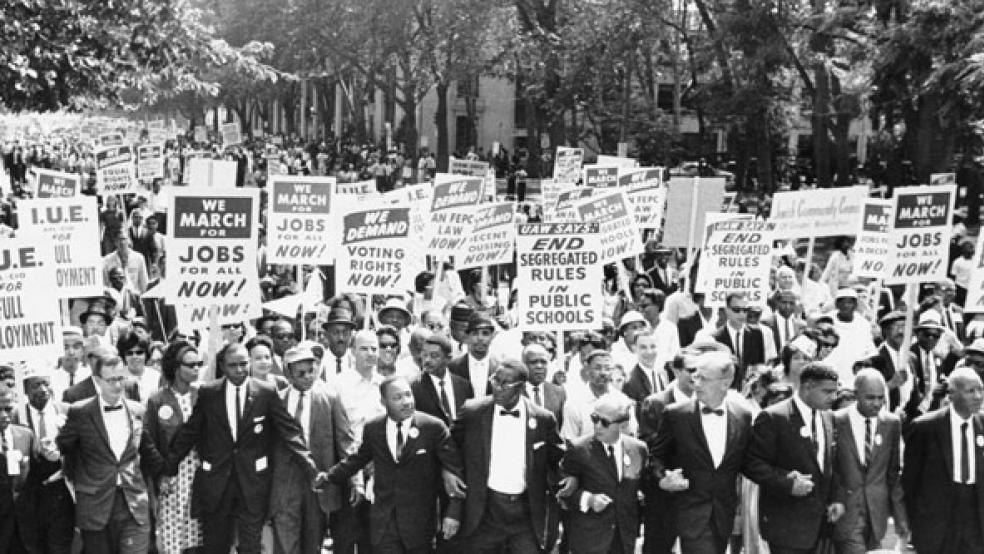President Obama paid tribute on Wednesday to the ideals and struggles of the civil rights movement, but the subtext of his message was aimed at the 2014 and 2016 elections.

Democrats are making long-term demographic gains in states such as Florida, North Carolina, and Texas—places where Republican state lawmakers have placed new restrictions on voting that would likely blunt the growing Hispanic population’s impact.
“Because they marched, the voting rights law was signed,” Obama said. “Because they marched, city councils changed and state legislatures changed and Congress changed and, yes, eventually the White House changed.”
RELATED: OBAMA WARNS OF COMPLACENCY 50 YEARS AFTER MARCH
The president added that to “secure the gains this country has made requires constant vigilance” and “challenging those who erect new barriers to the vote.”
It was a subtle link between an ongoing political battle and the dream declared by Martin Luther King, Jr., a half century ago. The new voting restrictions echo the baffling literacy tests and poll taxes of the Jim Crow era, although the extent of their impact remains unseen.
VOTING RESTRICTIONS
Since last year, 18 states have approved voting restrictions to counter alleged fraud that independent analyses have yet to verify. More than 80 combined electoral votes come from Texas (38.2 percent Hispanic), Florida (23.2 percent Hispanic), and North Carolina (30.7 percent Hispanic and African-American). Obama lost North Carolina and Texas last year, but he won 71 percent of Hispanics nationwide, according to the Pew Research Center.
New voter ID laws, the manipulation of precincts, and new limits on early voting and registration all seem to penalize minority groups. These either are disturbing violations of civil rights, or, at best, tinkering at the margins to prolong a Republican advantage that is steadily eroding.
“What you’re doing is postponing the inevitable,” said Michael McDonald, a George Mason University professor who analyzes voter turnout. “Maybe it helps you for one or two elections.”
Former Secretary of State Colin Powell said the restrictions could ultimately hurt Republicans, alienating an entire generation of minorities. "Here's what I say to my Republican friends: The country is becoming more diverse," Powell said Sunday on CBS News’ "Face the Nation."
"You say you want to reach out, you say you want to have a new message. You say you want to see if you can bring some of these voters to the Republican side," he said. "This is not the way to do it."
History backs Powell up. The majority of African-Americans voted Republican until the 1936 re-election of Franklin D. Roosevelt. That base steadily disappeared as GOP leaders such Arizona Sen. Barry Goldwater opposed civil rights measures.
For all the celebration of progress on Wednesday, Hispanics still seem to be sidelined at the polls. In 1964, a year before the landmark Voting Right Act, an impressive 58 percent of African-Americans cast their ballots for president. Just 48 percent of Hispanics did last year.
The Supreme Court in June struck down part of the 1965 Voting Rights Act, ruling that states with a history of discrimination no longer needed to clear their voting laws ahead of time with the federal government. Attorney General Eric Holder, Jr., sued Texas this month, claiming its Republican-dominant legislature discriminated against Hispanics with its redrawn congressional districts and voter ID law.
“If you take a look at all the obstacles that states are putting up to vote, they are just modern-day versions of poll taxes and literacy tests,” said Katherine Culliton-Gonzalez, director of the voter protection program at the Advancement Project.
As the equivalent of poll taxes, Culliton-Gonzalez said it can cost $22 to get a birth certificate to meet ID requirements. Naturalized citizens have to spend $345 to obtain back-up documents to verify their status. Non-English speaking voters often lack access to translated materials.
Texas banned the use of utility bills or pay stubs as a form of ID at the polls, although a concealed handgun license is now acceptable. The old standby of a driver’s license still works, but roughly a third of Texas’ 254 counties lacks a Department of Motor Vehicles branch office.
In North Carolina, which Obama lost by a whisker in 2012, state Republicans have cut back on early voting and same day registration, in addition to passing a voter ID law. Seventy percent of African-Americans cast their ballots early last year. “The state knows it’s going to have a discriminatory impact — but passed it anyway, despite no instances of in-person voter fraud,” said Culliton-Gonzalez.
Florida offers the counter-example to all the dire warnings about voter ID laws and other forms of suppression. Even though some Florida voters faced lines as long as 19 hours last year, Obama still snagged a victory there.
The Sunshine State shows that voter can adapt to changes to the rules — and that provoking with possible forms of discrimination can actually incentivize them to vote. While voting rights advocates say this should not be the new normal, it was how Democrats guaranteed another four years in the White House.
Florida Republicans in the statehouse reduced early voting hours last year, eliminating a key tactic that the Obama campaign relied on in 2008. So the campaign encouraged its base to cast their ballots by mail, a traditional advantage for the GOP.
In 2008, Republican presidential nominee John McCain had a 14 percentage point advantage in early voting by mail, an edge that shrank dramatically to within four percentage points for Mitt Romney in 2012.
Florida suggests that additional restrictions outraged enough people who responded by voting against the GOP. Along with Romney’s bizarre call for the self-deportation of illegal immigrants, it unwittingly accelerated a demographic shift.
“Anger,” said George Mason University’s McDonald, “is probably one of the biggest motivations for people to participate in politics.”




